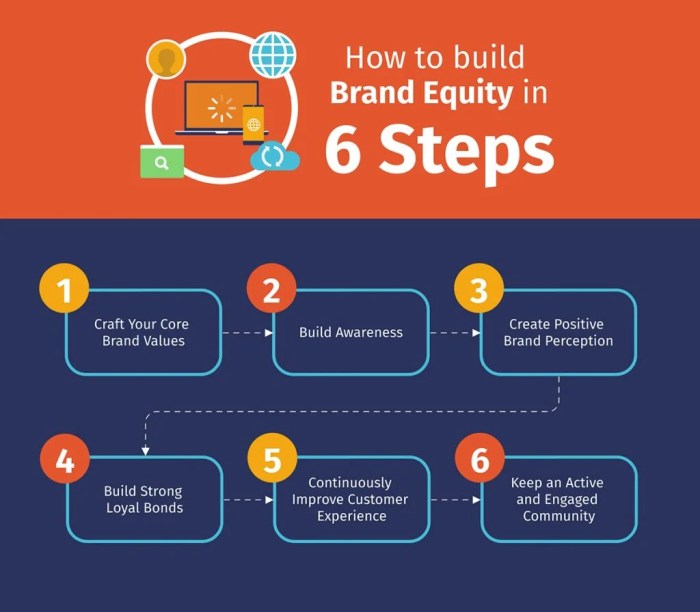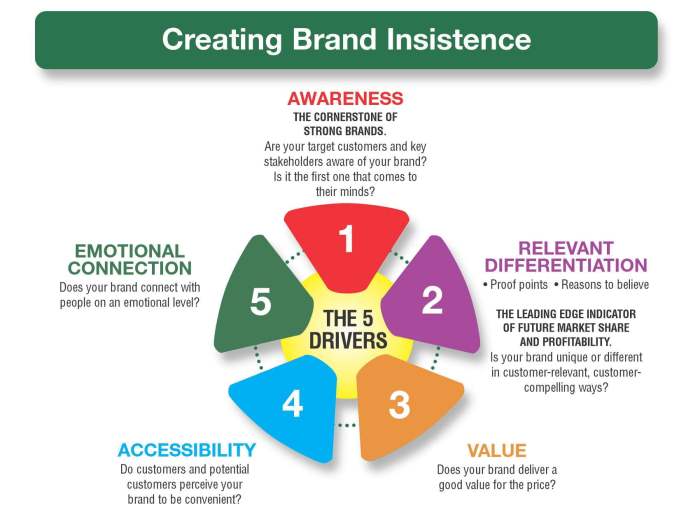Building Brand Equity sets the stage for companies to shine in a crowded market, showcasing their unique identity and winning over consumers with a blend of creativity and strategy. Get ready to dive into the world of brand building with a twist!
In this journey, we will explore the essence of brand equity, uncover effective strategies to strengthen it, and unravel the vital role of brand identity in captivating audiences. Brace yourself for a rollercoaster ride through the dynamic realm of marketing and branding!
What is Brand Equity?
Brand equity refers to the value a brand holds in the eyes of consumers. It represents the reputation, perception, and recognition that a brand has built over time. Brand equity is essential in marketing as it can influence consumer behavior, loyalty, and willingness to pay a premium for a product or service.
Differentiation from Competitors
Brand equity sets a company apart from its competitors by creating a unique identity and emotional connection with consumers. This differentiation allows a brand to stand out in a crowded marketplace and build a loyal customer base.
- Strong brand equity can lead to increased brand awareness and recognition.
- It can result in higher customer loyalty and repeat purchases.
- Brands with high brand equity often have the ability to charge premium prices for their products or services.
Examples of Brands with Strong Brand Equity
- Apple: Known for its innovative products, sleek design, and loyal customer base, Apple has established a strong brand equity that has propelled its success in the tech industry.
- Coca-Cola: With its iconic logo, consistent branding, and emotional connection with consumers, Coca-Cola has built a powerful brand equity that has made it a global leader in the beverage industry.
- Nike: Through its “Just Do It” slogan, celebrity endorsements, and focus on performance and innovation, Nike has created a strong brand equity that resonates with athletes and consumers worldwide.
Building Brand Equity Strategies

Building brand equity is crucial for the long-term success of any business. By implementing effective strategies, companies can create a strong brand that resonates with consumers and sets them apart from competitors. Let’s explore some key strategies for building brand equity:
Brand Positioning
Brand positioning is all about how a company wants its brand to be perceived by consumers. By clearly defining what makes their brand unique and different from others, companies can create a strong position in the market. This involves identifying the target audience, understanding their needs and preferences, and communicating the brand’s value proposition effectively.
Brand Awareness
Brand awareness is essential for building brand equity as it ensures that consumers recognize and remember the brand. Companies can increase brand awareness through advertising, social media marketing, public relations, and other promotional activities. The goal is to make the brand a familiar name that consumers trust and prefer over competitors.
Brand Loyalty
Brand loyalty is the result of consistently delivering a positive experience to customers. By providing high-quality products and excellent customer service, companies can build a loyal customer base that continues to choose their brand over others. Loyalty programs, personalized marketing campaigns, and exclusive offers can also help strengthen brand loyalty.
Brand Associations
Brand associations are the mental connections that consumers make between a brand and certain attributes or values. Companies can build strong brand associations by aligning their brand with positive experiences, emotions, and values. This could involve partnerships with influencers, sponsoring events, or supporting social causes that resonate with their target audience.Consistent branding and messaging play a critical role in building brand equity.
When consumers encounter a brand that maintains a consistent identity across all touchpoints, they are more likely to trust and connect with that brand. This consistency helps reinforce the brand’s positioning, build brand awareness, and strengthen brand loyalty over time.Successful companies have implemented various brand equity building strategies to establish themselves as market leaders. For example, Apple’s innovative product design, Coca-Cola’s timeless brand image, and Nike’s powerful brand messaging have all contributed to their strong brand equity and loyal customer base.
Importance of Brand Identity
Brand identity plays a crucial role in building brand equity as it helps consumers recognize and differentiate a brand from its competitors. It encompasses elements like logos, colors, and slogans that create a unique and memorable image for a brand.
Role of Logos, Colors, and Slogans, Building Brand Equity
Logos are visual representations of a brand that help in instant brand recognition. For example, the Nike swoosh logo is easily identifiable worldwide. Colors evoke emotions and associations, with companies like Coca-Cola using red to convey energy and excitement. Slogans or taglines capture the essence of a brand’s message, such as Apple’s “Think Different.”
Companies Utilizing Brand Identity Effectively
Apple
The bitten apple logo, sleek design, and “Think Different” slogan have helped Apple establish a strong brand identity associated with innovation and creativity.
McDonald’s
The golden arches logo, red and yellow color scheme, and “I’m lovin’ it” slogan have made McDonald’s one of the most recognizable brands globally.
Coca-Cola
The red color, classic logo font, and “Taste the Feeling” slogan have contributed to Coca-Cola’s brand identity as a symbol of happiness and refreshment.
Consumer Perception and Brand Equity: Building Brand Equity

In the realm of brand equity, consumer perception plays a crucial role in determining the value and strength of a brand. The way consumers view and feel about a brand directly impacts its success in the market. Building positive consumer perception is essential for enhancing brand equity over time.
Influence of Consumer Perception on Brand Equity
Consumer perception can significantly influence brand equity. When consumers have a positive perception of a brand, they are more likely to trust it, remain loyal to it, and advocate for it. On the other hand, negative consumer perception can erode brand equity, leading to a decline in sales and reputation.
Importance of Consistent Brand Experiences
Delivering consistent brand experiences is crucial for shaping consumer perception. When consumers consistently encounter a brand that delivers on its promises, they develop trust and loyalty towards the brand. Inconsistent brand experiences can confuse consumers and weaken their perception of the brand, ultimately impacting brand equity.
Enhancing Brand Equity through Positive Consumer Perception
- Positive consumer perception can enhance brand equity by increasing brand loyalty and advocacy.
- Consumers are willing to pay premium prices for brands they perceive positively, leading to higher profitability.
- A strong positive perception can create a competitive advantage for the brand in the market, attracting more customers and driving growth.












